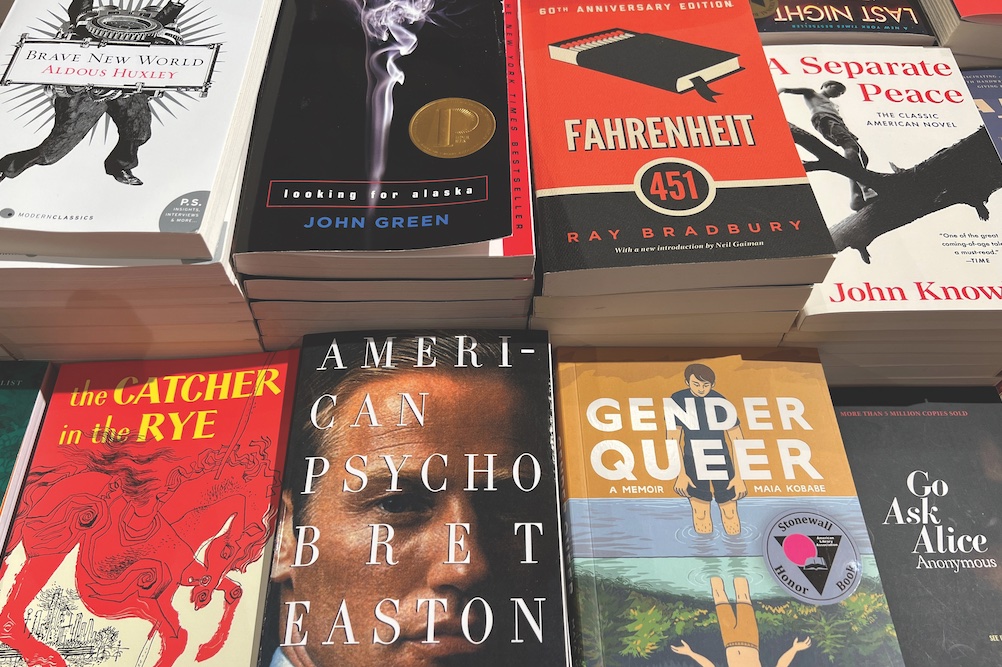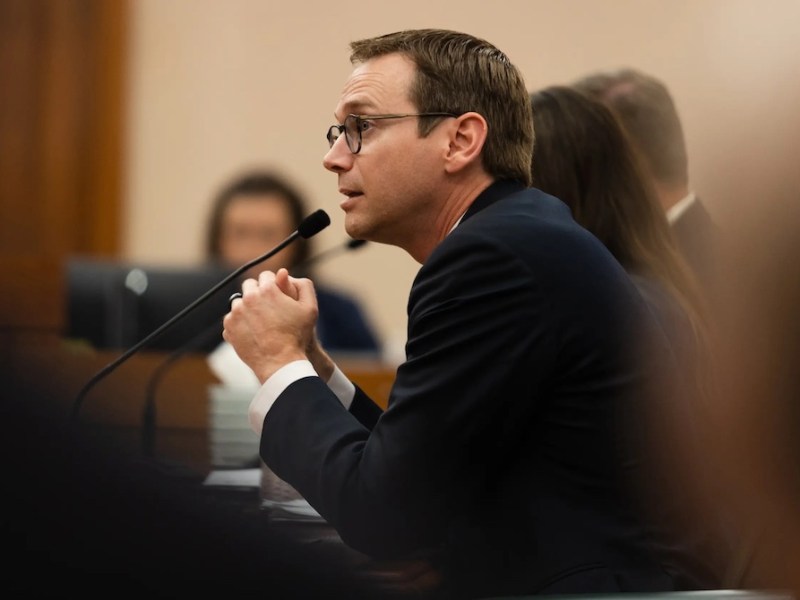 A book store display shows off frequently banned works of literature. Credit: Shutterstock / MKPhoto12
A book store display shows off frequently banned works of literature. Credit: Shutterstock / MKPhoto12
Bad Takes is a column of opinion and analysis.
With October already here and the baseball postseason underway, I encourage everyone so inclined to revisit the 1989 classic Field of Dreams.
In that film, Kevin Costner plays a 30-something husband and father who “majored in the ’60s” before pulling up stakes for Iowa to try his hand at farming. One day he hears an ASMR call of conscience amidst the rustling corn stalks. “
If you build it, they will come,” The Voice whispers, compelling him to plough under his own crop to clear way for a baseball field.
If only a similarly trustworthy deity could guarantee the return on investment of San Antonio’s new Missions stadium as well as Project Marvel.
But, alas, life ain’t like the movies.
Assuming it’s been a minute since you scoured Blockbuster for VHS tapes, you may have forgotten one of the film’s sadly still-relevant subplots.
“They’re talking about banning books again,” Amy Madigan, who plays Costner’s wife, informs him prior to a PTA meeting that evening. “Really subversive books like The Wizard of Oz and The Diary of Anne Frank,” she adds facetiously.
Cut to an irate mother screaming: “Smut and filth like this has no place in our schools!”
“Mrs Perkins, the book you’re waving about is hardly smut,” the principal patiently explains. “Terence Mann is a Pulitzer Prize-winner and widely regarded as the finest satirist of his time.”
Mann, played by James Earl Jones, was a fictional author based on the reclusive J.D. Salinger, also a baseball lover. Turns out Salinger threatened to sue the production to prevent the use of his name.
“The so-called novels of Terence Mann endorse promiscuity, godlessness, the mongrelization of races and disrespect to high-ranking officers of the U.S. Army,” the implacable parent expounds. “And that’s why right-thinking school boards all across the country have been banning this man’s S-H-I-T since 1969!”
After Madigan’s character, Annie, confronts the would-be censor, she turns her attention to those attending the meeting.
“Let’s put it to a vote, alright?” Annie asks them. “Who’s for Eva Braun here? Who wants to burn books? Who wants to spit on the Constitution? Anybody?”
No hands go up.
“Now, who’s for the Bill of Rights? Who thinks freedom is a pretty darn good thing? C’mon, c’mon, let’s see those hands! Who thinks that we have to stand up to the kind of censorship that they had under Stalin?”
A cornfield of hands shoot up.Upon leaving the gymnasium, an exhilarated Annie brags to her husband, “I just halted the spread of neo-fascism in America!”
Fast-forward three decades.
“The Iowa state government passed a book-ban law that was so vaguely drafted, it left many schools confused whether any books were allowed anymore,” Cody Johnston of podcast Some More News reported this August.
“Then, a lawsuit blocked the law from taking effect, but then a follow-up appellate case reinstated the law less than a year later. And in those various stages of limbo, Iowa’s librarians had to unshelve or reshelve and re-unshelve all of their copies of more than 3,400 titles.”
The deterrent of legal bedlam seems to have been the point. There have been “nearly 16,000 book bans in public schools nationwide since 2021, a number not seen since the Red Scare McCarthy era of the 1950s,” according to the most recent list compiled by free-expression nonprofit PEN America.
Texas plays second fiddle to nobody on this tune.
A “compassionate conservative”-era Republican turned diehard culture warrior, Gov. Greg Abbott signed Senate Bill 13 this summer, which warned boards of trustees to create an “advisory council to assist in ensuring that local community values are reflected in each school library catalog.” The legislation also demands the removal of any material that “portrays sexual or excretory organs or activities in a way that is patently offensive” or that includes “grossly offensive language considered a public nuisance.”
Will the newly appointed tribal elders ban biographies of the current president, given his penchant for grossly offensive language and his status as reigning public nuisance? Might they remove the Holy Bible upon reading Ezekiel 23:20, which graphically depicts an adulteress who “lusts after her lovers, whose genitals were like those of donkeys and whose emission was like that of horses?”
Even the stodgy ol’ Supreme Court has repeatedly held that judging books as obscene requires interpreting the work “taken as a whole.”
Yet self-deputized smut hunters continue to recite off-color excerpts from award-winning literature as if that were proof positive.“
Whether donated or purchased, all library books must now be publicly listed for at least 30 days before the school board can approve them, and the board must approve all library material acquisitions,” according to the Texas Association of School Boards’ website.
That means school boards terrified of religiously motivated blowback, not the professional librarians traditionally entrusted with the job.
Although Field of Dreams dramatized a genuine groundswell of parental concern, data compiled last year by the American Library Association (ALA) found that 72% of book censorship attempts originate from pressure groups, politicians or administrators. A mere 16% came from parents themselves. Indeed, 60% of the challenges in the 2021-22 school year were submitted by just 11 people.
All of this sets this year’s Banned Books Week, Oct. 5-11, apart as uniquely poignant. The ALA chose the theme “Censorship Is So 1984.”
In the Before Times, March 2016, journalist Glenn Greenwald sat down with public intellectual Noam Chomsky and exiled whistleblower Edward Snowden to confess he had “misremembered” George Orwell’s dystopian masterpiece.
“I remembered the warning of Orwell being, ‘If you live in a society where you’re always being watched, that’s when you lose freedom’,” Greenwald explained. “But I actually went back and read it [for the first time since high school], and the world that Orwell was warning of was not one in which we were all being watched, it was a world in which we could be watched at any moment. What you knew is you had to act as though you were being watched, which meant … obediently, compliantly, submissively and without dissent.”
And self-censorship risks atrophying the literacy muscles altogether.
In 2023, only 16% of Americans age 15 and up imbibed books for pleasure daily, according to a study in the journal iScience. That compares to 28% in 2003.
Before the censorial Moms For Liberty, there were the Minute Women of the USA. In 1953, a San Antonian named Myrtle Hance “combed through the books available at the [city’s public library] and declared 500 books to contain communist materials,” in the words of historian Madison Ingram’s recent Los Angeles Times op-ed.
The wife of San Antonio’s then-mayor “demanded that each book be branded with a large red sticker, so that readers would know they were ‘dangerous.’ Another city official went further, calling for the books Hance singled out to be burned.”
Now for the Hollywood-worthy all-American conclusion.
“It was the chief librarian who stood in the way,” historian Ingram pointed out in the op-ed. “Julia Grothaus, who’d served in her position for two decades, rallied the support of local writers, journalists and civic organizations; the Public Library Board of Trustees refused to go along with the mayor’s call for her resignation. Only because of her defiance, the books in San Antonio were not labeled or burned.”
If that doesn’t inspire you to go get yourself a library card and start reading, good luck waiting for a voice only you and James Earl Jones can hear.
Subscribe to SA Current newsletters.
Follow us: Apple News | Google News | NewsBreak | Reddit | Instagram | Facebook | Twitter | Or sign up for our RSS Feed
Related Stories
Faculty have spent weeks seeking clarity on new restrictions, which have often been issued by word of mouth. A written Q&A was rescinded.
Free speech experts say that when teachers speak in their personal capacity, even on school grounds but outside their official duties, they retain their right to comment on matters of public concern.


